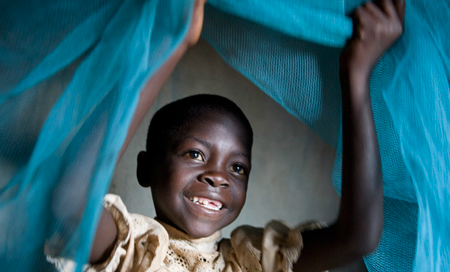MAHALIA SMITH
United Methodist Communications
While a new malaria vaccine for young children is a major breakthrough, United Methodist Church officials cautioned that Imagine No Malaria will need to continue the fight with existing preventative measures.Still, the first news of the vaccine approval was welcomed by those who have fought to end preventable deaths from malaria in Africa.
“The development of this vaccine is an important step in the elimination of malaria-related illness and death across the world,” said Bishop Tom Bickerton, chair of the Global Health Initiative for The United Methodist Church. The European Medicines Agency in late July approved Mosquirix, a malaria vaccine from GlaxoSmithKline, for further evaluation.
The World Health Organization estimated that 584,000 people died of malaria in 2013; African children under the age of five accounted for fourth-fifths of that total. The disease can be prevented by taking measures such as using bed nets and draining stagnant ponds where mosquitoes breed.
For young children only
The vaccine is only for children under 17 months.
“The vaccine provides less than 50 percent protection. [That] is important, but it would still need to be used alongside existing preventative measures. For now, nothing changes in our approach since the vaccine should be used with other preventative measures,” said Dr. Olusimbo Ige, executive director of Global Health at United Methodist Global Ministries.
A spokesperson from GSK said Mosquirix is the first vaccine that attacks the Plasmodium falciparum parasite, which causes malaria in young children. The vaccine, intended for use in babies and toddlers from six weeks to 17 months old, took 30 years to develop. The process included 15 years of lab development and 15 years of clinical trials in eight African countries. Studies show that the vaccine is 27 percent effective in infants and 39 percent effective in children after three to four years of follow-ups.
The next step in approval is for WHO to give recommendations and guidelines for the use of the vaccine. Then GSK will submit Mosquirix to WHO for prequalification, which will assess the safety of the vaccine. Then, countries will have to adopt the guidelines and arrange for distribution with GSK.
“We can only engage in the vaccine procurement when the vaccine becomes part of the approved immunization list of each country,” Ige said.
GSK developed Mosquirix in conjunction with the PATH Malaria Vaccine Initiative, funded since 1999 by the Bill and Melinda Gates Foundation.
Mosquirix is not for travelers, but only for those living in direct risk of malaria.
It is possible that in six to nine months, the WHO will send their recommendation. When distributed, GSK will not profit from the vaccine. The expected 5 percent return will fund further research into malaria vaccines.
INM a bridge
“Our ongoing work in Imagine No Malaria remains an important bridge that will continue to provide the needed goods and services necessary until the full development and implementation of a vaccine becomes a reality,” said Bickerton.
So far, the Imagine No Malaria campaign has raised $66 million towards preventing malaria deaths in Africa. Included in that total is a $1.6 million contribution by the United Methodists in Michigan.
Donations are essential for the many preventative measures and treatment options for malaria. The new vaccine does not change Imagine No Malaria’s mission to raise $75 million to decrease death from malaria.
“We are in this work for the long haul,” said Bickerton, “The news of this vaccine helps get us another step on the way to a malaria free world.”
Last Updated on February 6, 2024

